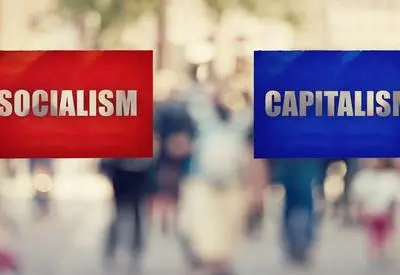People espouse all sorts of seemingly unfounded, crazy-sounding political beliefs. It’s led many commentators to think that political beliefs are just irrational. Others have argued that people don’t really believe what they say; they’re just supporting their political team, just like in sports. But if our political preferences are just as arbitrary as our choice of sports teams, we can hardly call them rational, argues Oliver Traldi.
Around the 2016 American presidential election, which saw the rise of Donald Trump and the ushering in of what was dubbed a post-truth era, both philosophers and pundits started to take very seriously the notion that politics and epistemology – the study of belief, rationality, and knowledge – had a lot to do with one another. Many commentators, as it turned out, began to wonder whether what was going wrong in American politics had something to do with problematic ways people were forming their political beliefs.
 SUGGESTED READING
The blurred line between facts and values
By Fabienne Peter
SUGGESTED READING
The blurred line between facts and values
By Fabienne Peter
Some blamed technology. We’re sorted into bubbles by algorithms that care about clicks, not truth, feeding us fake news, propaganda, disinformation, and conspiracy theories. Others blamed culture. We have entered a post-truth era, unmoored from any collective sense of objectivity; people espouse whatever they can get away with. Furthermore, we’re polarized, sorted socially and geographically along partisan lines, each group reading its own newspapers and magazines, and even consuming beverages from different stores. Still others have blamed our leaders. Irresponsible politicians, talking heads, and headline writers lead to crazy beliefs when people naively put their trust in them. We should have trusted the experts instead, the argument goes.
One of the most common culprits cited has been our psychology. We’re built for “tribal” conflicts, because of our evolutionary past, some theorists claim. In the two-party American system, this “tribalism” takes hold, leading us all to believe crazy things, seeming to blur our very perception, the way it might seem to be blurred during a World Cup soccer game when what looks like a penalty to one team’s supporters looks like it wasn’t a foul to the other’s. The mechanisms for this are cognitive biases, especially confirmation or “myside” bias and motivated reasoning.
___
We’re built for “tribal” conflicts, because of our evolutionary past, some theorists claim.
___
Probably the fullest story that’s been told about messed-up political psychology is Jonathan Haidt’s moral foundations theory. Haidt has argued that liberals and conservatives have different political brains, and that it is this difference which determines their political stances. According to Haidt, this difference originates in pre-rational moral intuitions, pushing politics beyond the realm of rationality.
 SUGGESTED READING
Political labels are a farce
By Hyrum Lewis
SUGGESTED READING
Political labels are a farce
By Hyrum Lewis
More recently, some writers, most notably Hrishikesh Joshi, have taken the opposite tack, arguing that no moral principles or factual claims unify the proposals of major party platforms. Our political beliefs are thus irrational when taken as a package; they don’t form a coherent whole, as we might like to think, but are probably derivative of our partisan loyalties, responsive neither to data nor to sustained moral reflection. This picture has not been without its critics, who try to demonstrate that our political beliefs are in fact rational.
___
Our political beliefs are irrational when taken as a package; they don’t form a coherent whole, as we might like to think.
___





















Join the conversation